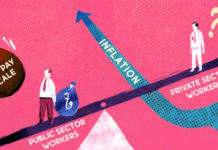More than seven decades ago a British economist Roy Harrod had advanced a theory that implied the growth rate of an economy was equal to the investment-output ratio divided by the capital-output ratio under some assumptions. This formula still forms the bedrock of macroeconomic planning exercises in many countries including Bangladesh. According to it an accelerated rate of advance of GDP is achievable only by a corresponding acceleration in the momentum of investment if reducing the capital-output ratio is not possible, which is usually the case. Hence, if Bangladesh aims to achieve a growth rate in excess of 7 percent, the investment-GDP ratio must be increased much beyond its current 25 percent.
The foregoing should make it clear why it is difficult to forecast growth without a good idea about the quantum of investment undertaken in the economy.
Unfortunately, statistics on investment in Bangladesh are hard to come by and the data that are available is of doubtful quality. BBS publishes aggregative data on investment on an annual basis with a lag of about a year. These are of little use for forecasting purposes. Hence, researchers have been forced to rely on proxy variables that are more readily available. These include data on growth of domestic credit, especially that to the private sector, and import of capital machinery, industrial raw materials and intermediate goods. These are usually available with a lag of about two months.
 Investment, especially industrial investment, is usually done with borrowed funds; hence total credit given out by the banking sector gives some indication of the scale of investment. The growth rate of total credit has declined from 14.42 percent during the first three quarters of 2011-12 to only 7.97 percent during the same period of the current fiscal (Bangladesh Bank, Selected Indicators, 29 may 2013). However, the growth rate of credit to the government and the public sector during this period increased by 11.6 percent. The impact of this growth was largely offset by the reduced pace of private credit whose growth fell from a robust 13.62 percent to only 6.98 percent during the same interval. The large reduction in private credit was most likely caused by a fall in investment demand due to confrontational politics, exorbitant financing costs, inadequate power supply, poor governance and a gloomy international economic outlook. This is consistent with the view of the business community.
Investment, especially industrial investment, is usually done with borrowed funds; hence total credit given out by the banking sector gives some indication of the scale of investment. The growth rate of total credit has declined from 14.42 percent during the first three quarters of 2011-12 to only 7.97 percent during the same period of the current fiscal (Bangladesh Bank, Selected Indicators, 29 may 2013). However, the growth rate of credit to the government and the public sector during this period increased by 11.6 percent. The impact of this growth was largely offset by the reduced pace of private credit whose growth fell from a robust 13.62 percent to only 6.98 percent during the same interval. The large reduction in private credit was most likely caused by a fall in investment demand due to confrontational politics, exorbitant financing costs, inadequate power supply, poor governance and a gloomy international economic outlook. This is consistent with the view of the business community.
A worrisome development is the drastic fall in capital import demand; LC settlement for capital machinery has fallen by 18.09 percent during the July-March period of 2012-13 when the same had increased by 22.18 percent during the corresponding period of 2011-12. The LC settlement for import of machinery for miscellaneous industries has also declined by 10.16 percent.
Incidentally, the import of computers and accessories has declined by 9.23 percent suggesting a significant deceleration of the march toward a digital economy. The substantial decline in the import demand of all types of capital machinery is suggestive of a significant slowdown in investment activities.
Current industrial production also seems to have slowed down. Import of industrial raw materials has declined by 6.84 percent during the July-March period of this fiscal. During the same period the LC settlement for import of intermediate inputs has declined by 9.94 percent. In a normal year these should have increased robustly to support the growth of industrial production. Stagnancy in industrial production is also indicative of a decline in the momentum of investment both because a large part of investment is part of industrial production and a slowdown in the latter discourages the former.
When the numbers quoted above are considered together with the current tight monetary policy, exorbitant capital costs, violent political confrontation, governance problems and the global economic slowdown especially in our major export markets, it is difficult to escape the conclusion that there has been a significant downturn in private investment. If this situation does not reverse soon economic growth will be a casualty and could fall below 6 percent in both this and the next fiscal year.
These deductions reached on the basis of available data are consistent with the sentiments of the business people and experts. They have been voicing serious concerns about the poor business and investment climate because of the aforementioned malaises afflicting the economy. One would also get the same impression from casual empiricism.
The government should not dismiss these concerns offhand. It should pay heed and take urgent steps to raise total investment. It can do so by increasing productive public investment, especially in physical and social infrastructure and by instituting appropriate policy changes to encourage private investment, both domestic and green field foreign investment. Given that a large budget deficit is building up and there are serious governance issues, the government would be well advised to do more of the latter and less of the former.
An improvement in the overall business climate is essential to achieve such an outcome. This cannot be achieved without significant improvement in governance. The confrontational politics that has been unleashed so unscrupulously has done a great deal of damage to the economy. It will continue to bleed the economy until the government reaches out for a political accommodation. If it fails to do so the posterity may regard it as a government of broken promises, reckless hostility and lost opportunities.
Source: Bd news24










